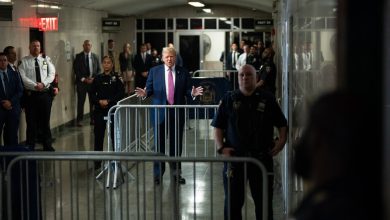For Bill Ford, ‘Every Negotiation Is a Roller Coaster’

As a 25-year-old junior executive at the car company that bears his last name, William Clay Ford Jr. had a bracing introduction to labor negotiations when a union official demanded that he stand up and vouch that he was made of the same stuff as his great-grandfather Henry Ford.
Mr. Ford, now the company’s executive chairman, harked back to the moment in an interview this week about how he and his company are navigating one of their most difficult labor negotiations in decades.
The United Automobile Workers union has shut down three Ford plants, including its largest, and other plants and distribution centers at General Motors and Stellantis, which owns Chrysler. The union’s new president, Shawn Fain, has said he is prepared to call workers out at more plants if his demands for big raises, better benefits and job security are not met. He has referred to the companies as “the enemy,” and has said the union is fighting “corporate greed” and standing up to the “billionaire class.”
In a speech this week, Mr. Ford said the strikes were helping nonunion automakers like Tesla, Toyota and Honda. Mr. Fain responded that workers at those companies were future U.A.W. members.
In an interview after his speech, Mr. Ford said he had been counseling his executives not to let Mr. Fain’s words get to them and focus on getting a deal done. Mr. Ford also recalled his first difficult conversation with a union official.
In 1982, Mr. Ford said, his father invited him to sit in the room for talks with the U.A.W. As a newcomer, he was not allotted a seat at a table where about 50 union negotiators sat on one side and an equal number of Ford executives on the other.
Sitting against the wall, he was approached by an older union representative. “You, stand up,” the man said. “What are you made of? I knew your great-grandfather and your grandfather. I knew what they were made of. What the hell are you made of?”
Mr. Ford said he had replied sheepishly that he had never known his great-grandfather and grandfather but that he shared their values. Similar confrontations followed daily — “I lived in terror of going to work,” Mr. Ford said.
Then about a week later, the union officials invited him to a local bar. “Come with us,” Mr. Ford said they had told him. “You passed the test.”
This interview was condensed and edited for clarity.
Have you been involved in any talks that are comparable to the current negotiations?
No, but every negotiation is different, and every leader is different. What I keep saying to our executives is: ‘Don’t take this personally. A lot of it is theater. The most important thing is get the deal done. The rhetoric doesn’t matter.’ Every negotiation is a roller coaster. Some are not pleasant, and some sting. Don’t overreact. And when it’s all over, we are still one team again, and have to go forward.
Are you going to be on the same team at the end of these talks?
I believe we will. I know many on their negotiating team personally, and some of them, I play hockey with them and consider them very close friends.
You’ve said the real competition is not U.A.W. vs. Ford but the U.A.W. and Ford against Toyota, Honda, Tesla and the Chinese automakers. Do you think the union’s leadership agrees with that?
I hope so, because if they don’t, it will be catastrophic. They can have disagreements with us and bargain hard, but we are not the enemy. I will never consider our employees the enemy. I think the employees know who the real competition is, and they will come together with us when this is over. We made a conscious decision to add jobs here in America when our competitors were moving production to Mexico.
Would the offer you have on the table now put Ford at a significant disadvantage to other automakers?
It certainly won’t be an advantage. We could live with the deal we have proposed, but just barely. If you go beyond that, we are going to have to start making hard decisions in terms of investments and future products.
Shawn Fain has said the workers have fallen behind while the automakers and executives like Jim Farley, Ford’s chief executive, and Mary Barra, G.M.’s chief executive, have prospered. How do you respond?
Everyone’s going to have their own viewpoint on executive compensation, and I totally get that. But I also know what the market is for top talent. You have entertainers and athletes who are making more than Jim Farley and Mary Barra. But that’s what the market is, and the company with the best talent wins, period.
There were some years in the lean years when I took no pay, and I would do it again if I had to.
You have three plants shut down by the strike. How is that affecting your operations?
It’s messy, and it’s going to become messier. The most immediate effects will be on the suppliers. The supply base is very fragile. It barely survived Covid, and is not all the way back, so a prolonged strike will start collapsing the supply base, and then making anything in this country will be difficult.
Manufacturing is a matter of national security, and we saw that during Covid. And I hope with all my heart we never get into another war, but if we did, this industry would be critical to defending our nation, as it was in World War I and World War II. Other industries can make small numbers of things. The auto companies can turn that into tens of thousands of things.
“I never thought I would see the day when our products were so heavily politicized, but they are.” — William Clay Ford Jr.
What’s your outlook on the U.S. economy?
I think it’s fragile. Inflation is taking its toll. The consumer is still spending, but we’re watching it very carefully. On the other hand, there’s still strong employment, and we are seeing our sales hold up. There are conflicting signals, for sure.
Let’s talk about electric vehicles. About 18 months ago, you launched the F-150 Lightning pickup. It seemed like electric vehicle sales were going to take off. But now Ford is slowing production of that truck. What happened?
E.V. sales are still up 50 percent this year, so sales are growing very fast. But we’ve also seen a politicization of E.V.s. Blue states say E.V.s are great and we need to adopt them as soon as possible for climate reasons. Some of the red states say this is just like the vaccine, and it’s being shoved down our throat by the government, and we don’t want it. I never thought I would see the day when our products were so heavily politicized, but they are.
The other is prices. Electric vehicles are expensive. We know prices will come down, and as that happens, we will have a bigger ramp-up of E.V.s. Keep this in mind: The most valuable company that our industry has ever seen is Tesla, and it’s growing. That’s a very instructive point when people say E.V.s are not desired.
Are you concerned about some of Donald Trump’s comments? He just came into Michigan and said that the transition to electric vehicles is going to result in almost all auto production moving to China.
I don’t want to personalize this, because, frankly, we have to pick a path forward and our lead times are longer than political lead times. So we can’t overreact to one bit of rhetoric or another. We have to deal with the most likely scenario, and how we can create the most value for our company, so we are pushing ahead with E.V.s because we do believe they have great application for a lot of people. And once people drive E.V.s, they will see that it’s a great experience.
Electric vehicles are expensive. Did Tesla’s price cuts have a big effect on your business?
That’s what we have seen with every new technology that has been adapted. You come down the cost curve pretty quickly as batteries get better.
With our first-generation E.V.s, the Lightning and the Mustang Mach-E, they were done with a lot of internal combustion engineering in them. The next generation, which will start coming quite quickly, was developed with a clean sheet of paper. When you do that you can really start taking cost out, and then you can start pricing them accordingly.
Tesla has been leading the price cuts, because they can with their scale. That’s something we are actually counting on in the future. And we will have products that compete and make money in that world.




